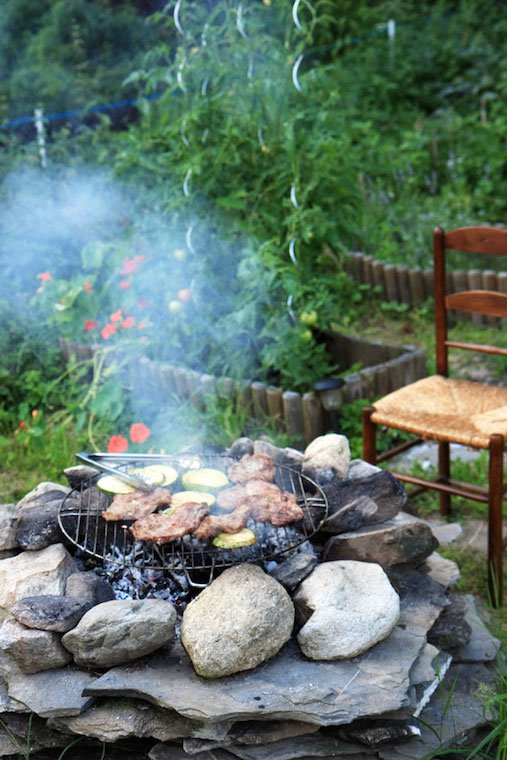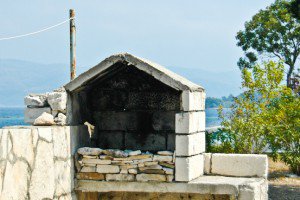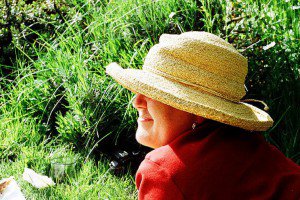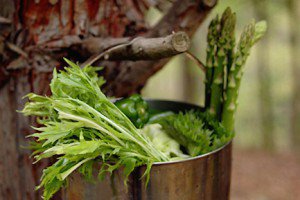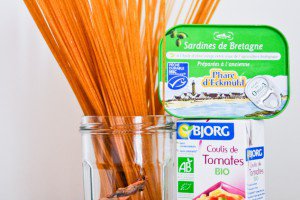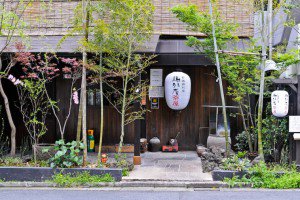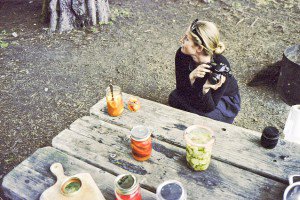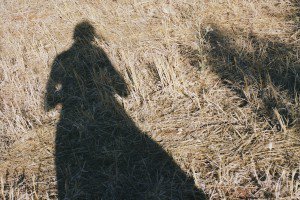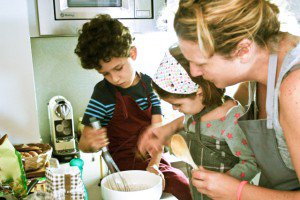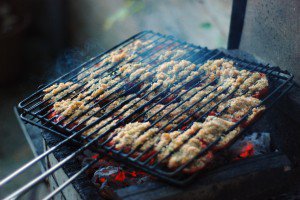This is part of a series of Q&A’s about cooking on vacation. The complete list of posts in this series is available here.
Lucy Vanel is an American writer and photographer who lives in Lyon, and writes beautifully about food on her blog Lucy’s Kitchen Notebook. She has a particular talent for capturing minute moments, holding them up in her hand for us to see before they vanish, and I always leave her blog feeling like the strings of my heart have been tugged a little. In Lyon she organizes herb workshops and personalized classes and tours, and she is currently working on renovating and equipping a teaching kitchen in Lyon’s first arrondissement, set to open in early 2012.
Here she tells us about the transformative experience of cooking on a wood stove, eating soggy things on a boat, and what to do when you accidentally break off green tomatoes from your plant.
Are you taking a vacation this summer, and will you have a chance to cook?
We take a vacation every summer. Three years ago, we bought a little tiny house in the Alps. During the month of August, we always spend at least two uninterrupted weeks there. When we first began to fix up the old house, I found a Mother Jones article on restoring wood stoves and decided to restore the old Godin in the kitchen. While at first it was just for fun, we realized It was a really great cooking stove in addition to heating the entire house. My vacation cooking is all about that stove.
I was browsing through an old French cookbook, and realized that it was really a chapter and verse maintenance guide for my old stove. These stoves were used in many households of rural France until relatively recently. Contemporary updated recipes give exact temperatures, times, etc. but the old ones give descriptives that fall right in line with wood stove cooking. Cooking this way has helped me come to a closer understanding of the techniques that I learned to execute with my modern equipment. Things are more instinctive with this kind of stove. You know when it is logical and necessary to use a bain marie, for instance, and come to a better understanding of what kind of heat is best for braising. The big cast iron cooktop’s natural heat zones gives just as much control as any contemporary piece of equipment.
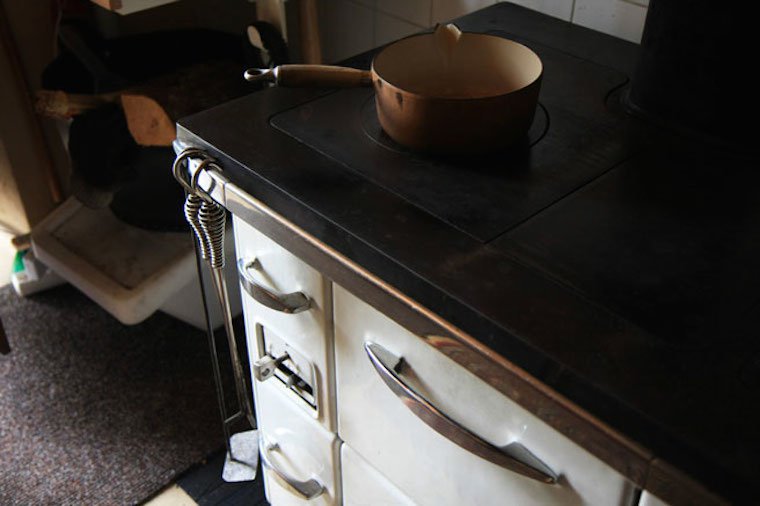
Photography by Lucy Vanel.
In what way do you feel your vacation cooking style differs from your everyday cooking style?
Vacations in the mountains entail fires that are lit in the morning and burn all day, which is not the case at home in the city. When we leave to go walking and foraging, we close down the vents to keep the fire going while we’re gone, and then stoke it up good and hot when we get back. Often I’ll leave a pot simmering, things pulled to the edge of the stove to cook slowly, or put a loaf of bread or a cake in and leave it to cook from the residual heat, so that when we get back we’ve got warm bread or a cake waiting. When we’re on vacation, I can easily cook dishes that take several days to do, because the steps involved in these kinds of dishes roll out naturally. There is always something cooking when we’re in the mountains.
Are there utensils or ingredients you always take with you when you go on vacation? If so, what are they? If not, what do you unfailingly regret not taking?
When we’re on vacation, I always bring cookbooks for ideas and reading since we don’t have any internet up there. It never fails that if I leave a cookbook behind, I’ll wish I brought it. I am working on getting two copies of my favorites, but it’s going to take a while. In the meantime I haul sacks of books in between. This year I plan to bring fresh rennet and also the ice cream machine, so we can make cheese with milk from nearby farms, and ice cream this vacation.
I have already stocked the mountain kitchen with utensils, good knives, sharpening tools, all the pots and baking supplies I need. We don’t have a microwave or any electric or gas appliances up there, and sometimes, early in the morning, if the kitchen is cold, it’s raining, I don’t want to go out for firewood, and people need breakfast, I scold myself for being so stubborn and refusing these modern conveniences. Otherwise I would not change a thing.
What is your best vacation cooking memory, as a child or an adult? And your worst (gruesome details welcome)?
As an adult, my best vacation cooking memories aside from the wood stove are coming from grilling over wood fires outside in the fire pit we made by the garden. We have an apple tree that lost a few branches in a storm a couple of years ago, and a neighbor came and cut them into logs for us, slightly too large to go into the wood stove. This summer, we have enjoyed grilling with this apple wood that really imparts a marvelous flavor. After setting the table outside with proper linens and silverware, hanging a lantern from a branch of the tree, and enjoying a nice apéro at sunset, we relax and grill vegetables from the garden and meats and enjoy them by lamplight.
My childhood vacation memories entail eating while traveling. During the summers, we used to spend weeks at a time cruising on the sailboat my father built, and the situation in the galley was that the ice box would always begin magnificently with a huge block of ice that would progressively melt, creating a colossal sloppy mess full of floating things and suspended mystery clouds of particles and specks. A huge nasty sponge would stir up and soak up the juice and my mother would squeeze it into a bucket that she took up and threw overboard from the cockpit.
Any food in there was inevitably submerged in water and then mopped off with this nightmare sponge that doubled for cleaning. It is a wonder no one ever got food poisoning. The waterlogged things we ate! We ate soggy cheddar cheese, wiped off any bottle gripped with fear of cooties before opening it, and would fish submerged eggs from their spongy carton before cracking them into pancake batter. Eventually, my father installed a refrigerator and our culinary experiences improved significantly on the boat.
Do you have a tip or saving-grace recipe that makes your kitchen life easier while on vacation?
My advice would be to look around and cook what you find while you’re on vacation, instead of trying to find ingredients for a special recipe.
We recently roasted some pork cutlets marinated with some green tomatoes that I accidentally broke off trying to trim the plants in the garden (see recipe below).

Have you tried this? Share your pics on Instagram!
Please tag your pictures with #cnzrecipes. I'll share my favorites!
Ingredients
- 3 green (unripe) tomatoes, diced
- 3 shallots
- 1 clove of garlic
- 1 onion
- 1 heaping teaspoon brined green peppercorns
- 1 heaping teaspoon capers
- 2 sprigs of fresh summer savory or marjoram
- 1 heaping teaspoon sea salt
- hot pepper powder like cayenne or piment d'espelette (to taste)
- the juice of 5 limes
- 1/2 cup green olive oil
Instructions
- Mince the shallots, garlic, onion, green peppercorns and capers.
- Wash the herbs and remove the leaves (discarding the stems), then crush and chop them.
- Put the herbs and minced and chopped things in a bowl and toss with the remaining ingredients.
- Spread this over your cutlets and let them marinate in a cool place, turning from time to time, for 3 to 4 hours before grilling over a wood fire that you've burned to embers.
Notes
We used applewood, and that gave an amazing result, but you can use whatever kind of wood you have on hand.
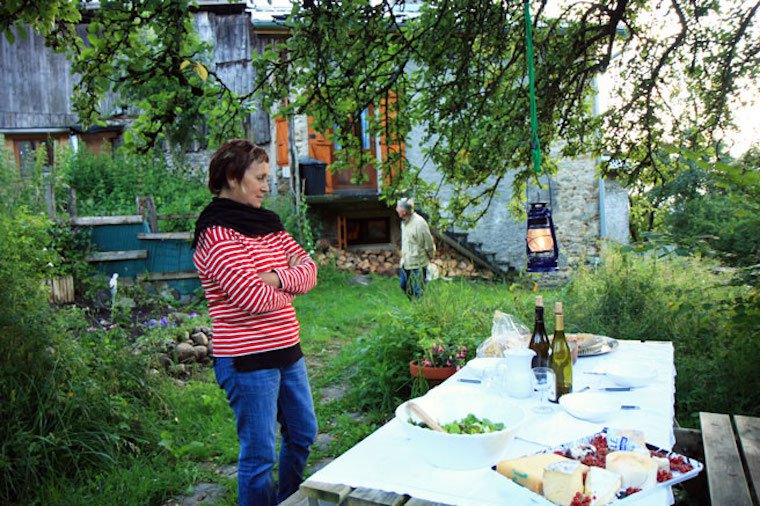
Photography by Lucy Vanel.
Photography by Lucy Vanel.


